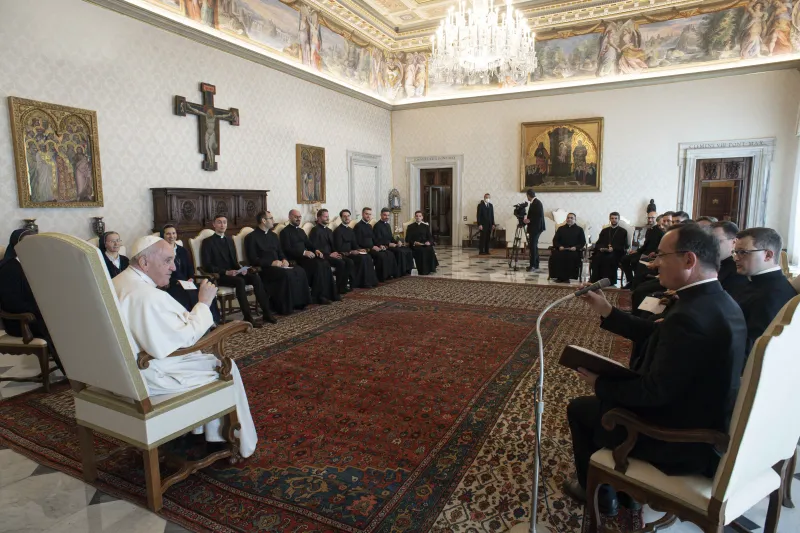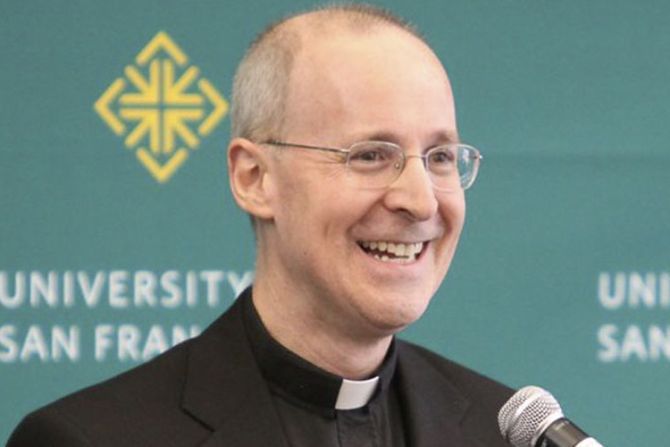
Vatican City, Apr 7, 2022 / 10:55 am (CNA).
Pope Francis on Thursday recalled the 500th anniversary of the election of Pope Adrian VI, who sought reconciliation between the Catholic Church and Martin Luther during his short pontificate.
“In his brief pontificate, which lasted only a little more than a year, he sought above all reconciliation in the Church and the world, putting into practice the words of St. Paul, according to which God entrusted precisely to the Apostles the ministry of reconciliation,” Pope Francis said on April 7.
For this reason, Adrian VI sent the nuncio to the Imperial Diets of Nuremberg “to reconcile Luther and his followers with the Church, and expressly asking forgiveness for the sins of the prelates of the Roman Curia,” he stated.
“Courageous,” Francis added. “He would have plenty of work today.”
Pope Francis spoke about Adrian VI, who was elected in 1522, during a meeting at the Vatican with the community of the Pontifical Teutonic Institute of Santa Maria dell’Anima, a college for German seminarians in Rome.
Adrian VI is buried in the Roman church Santa Maria dell’Anima, which is connected to the seminary.
Born in Utretcht, then part of the Holy Roman Empire of the German Nation, Adrian was the last non-Italian pope before the election of the Polish Pope John Paul II in 1978.
Pope Francis noted that, “in the political sphere, overcoming much resistance, [Adrian VI] worked to reach an agreement between the two bordering powers, King Francis I of France and Emperor Charles V of Habsburg, also so that together they could stem the increasingly threatening designs of conquest by the Ottoman army.”
“Unfortunately, Pope Adrian, due to his premature death, was unable to conclude any of these projects. Nevertheless, his witness as a fearless and tireless worker for faith, justice and peace remains alive in the memory of the Church,” Francis said.
He urged the members of the college seminary to follow the example of Pope Adrian VI to grow in their vocation as servants of the Church.
“In particular, thinking of his solicitude for the promotion of concord and reconciliation, I urge you to follow in his footsteps above all in your role as ministers of the Sacrament of Penance. This is important: the task of the confessor is to forgive, not to torture. Be merciful, be great forgivers, that is what the Church wants you to be,” he said.
“This means giving time to listening to confessions, and doing it well, with love, with wisdom and with great mercy.”
If you value the news and views Catholic World Report provides, please consider donating to support our efforts. Your contribution will help us continue to make CWR available to all readers worldwide for free, without a subscription. Thank you for your generosity!
Click here for more information on donating to CWR. Click here to sign up for our newsletter.





We should celebrate commonalities, never forgetting to rejoice in our Lord and Saviour Jesus Christ. No one could have a finer guide. Self righteousness is destructive and brings no honour to the one who laid down His life to redeem our eternal soul.
We esteem our Lord when we honour our fellow man. Listening shows respect and is a worthwhile teaching instrument. Concordance is to be sought, for Jesus is peace and understanding.
Matthew 7:12 “So whatever you wish that others would do to you, do also to them, for this is the Law and the Prophets.
Romans 12:10 Love one another with brotherly affection. Outdo one another in showing honour.
1 Peter 2:17 Honour everyone. Love the brotherhood. Fear God. Honour the emperor.
Pope Adrian VI…”’Courageous,’ Francis added. ‘He would have plenty of work today.’” So very true, and from the pope some very welcome dry humor! We are encouraged by insightful articles like this one.
But, now, the Lutheran trajectory, set loose and amplified in history, is cross-dressed as the German “synodal way” which not only fully detaches human morality from (Luther’s) faith in Christ, but also intends not only to houseclean the curia but to dismantle the apostolic succession altogether, likewise the unfolding magisterium (our immunity against an ecclesiastical cancel culture, e.g., the defenestrated Veritatis Splendor?), and even the transcendent meaning and healing power of the sacraments, including especially the sacrament of Penance as stressed by Francis, and the nature and permanence of Holy Orders—as instituted by, oh yes, the incarnate Jesus Christ.
What to do now? Listening, yes, but does a fireman negotiate with the fire?
A stitch in time saves nine. But the cat is out of the bag and the horse is out of the barn. But, yes, Pope Adrian VI is a valuable model of governance even and especially for our interesting times. If only Adrian VI had lived long enough to possibly nip this thing in the bud.